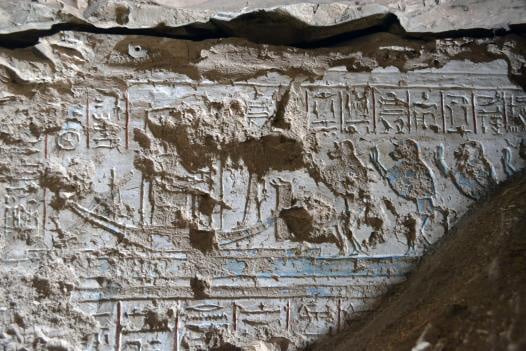
A team of Japanese archaeologists have unearthed a 3,000-year-old tomb in the Theban necropolis (the term for a large cemetery belonging to an ancient city) located on the west bank of the Nile in Egypt, according to a report by the New York Observer.
Researchers have deduced that the newly-discovered tomb dates back to the Ramesside period (c. 1200 BCE), and was constructed for a man named Khonsu, who held the position of Royal Scribe. Of particular note is the size and highly-embellished nature of the tomb—the likes of which have not been matched by other findings the same team has made in the past.
Detail of Khonsu and his wife in worship. Photo courtesy Waseda University.
Mapped out in a shape resembling a T, the burial site includes elaborate wall and ceiling decorations as well as hieroglyphs proclaiming Khonsu to be the “true renowned scribe.” Various images portray Khonsu in different facets of his life: with his wife, or worshipping the gods Osiris and Isis, who are also pictured elsewhere in the tomb.
Other illustrations depict the deity Ra-Atum amongst four baboons bowing down in reverence, and additional inscriptions on the ceiling confirm the tomb as belonging to Khonsu.
Waseda University Professor Jiro Kondo, who led the expedition, stumbled upon the extravagant grave while cleaning the tomb of the high powered soldier Userhat—leading him to believe that the possibility of finding other concealed tombs is high.
“No one knows that unknown tombs that still have beautiful decorations or inscriptions still remain undiscovered…” Kondo told the Observer. “I think that there might be more tombs hidden in this area.”
The Japanese professor is a seasoned archaeologist, having also uncovered the tomb of Chief of the Workshop for Mut and Chief Brewer of the Temple of Mut, Khonsuemheb in the same area in December 2013. What further discoveries the team might find have yet to be seen, though further exploration of Khonsu’s 3,000-year-old tomb is guaranteed: at present, piles of stone bricks are blocking entry to an inner alcove within the crypt, which the archaeologists predict houses more ancient wall drawings.